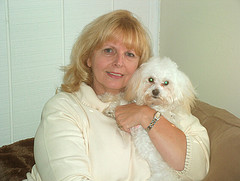
"All I want is one person to get out of that fear mode. I was so afraid," Paul Glover says about why he's sharing his multiple sclerosis story. Before he received the diagnosis, he was a triathlete as well as a surfer
Former surfer wants to spread the word on MS
By Michelle L. Klampe
March 9, 2007
Paul Glover was floating on his surfboard in the water just off Oxnard Shores when the effects of the disease struck. He felt disconnected, like his limbs weren't attached to his body. His speech was slurred and his equilibrium out of whack as he paddled back to shore. When he got out of the water, he couldn't keep hold of his long board.
"I just thought to myself, ‘Something's wrong here. This doesn't feel right,'" Glover said, describing the day four years ago. It was the last time Glover, an Oxnard resident and avid surfer much of his life, rode the waves. "I kept dropping my surfboard."
At first he thought he had water in his ears, or maybe suffered from surfer's ear, but a visit to the doctor and a careful ear-cleaning didn't correct the problem.
Finally an MRI and a spinal tap helped doctors pinpoint what ailed Glover: multiple sclerosis, a chronic and unpredictable disease of the central nervous system that can have both physical and cognitive symptoms that occur at random, sometimes months or years apart, often worsening over time. Symptoms include loss of balance, numbness and tingling, sensitivity to heat or cold, problems with memory and concentration, paralysis or vision problems.
Women are twice as likely as men to receive diagnoses of MS.
No government tracking system
It is a disease that is difficult to diagnose, treat, and even track. A recent review of medical research regarding MS indicated the disease may affect 50 percent more people than a previous review in 1982 indicated, according to the medical journal Neurology, which published an article on the subject in January. Researchers who conducted the review estimated one in 1,000 people could be affected, about 320,000 in the U.S.
However, the National Multiple Sclerosis Society believes even that number is too low. Its records indicate about 400,000 people in the U.S., including about 1,000 in Ventura County, are afflicted with the disease. There is no system for government tracking of the disease nationally, in part because it is not a communicable disease, said Marni Deckter, communications director for the Multiple Sclerosis Society's Southern California Chapter.
The National Multiple Sclerosis Society is developing a pilot study to determine whether it's feasible to track MS. Tracking could lead to better understanding of the disease, because it could reveal commonalities among those with MS.
"Knowing the numbers doesn't change the treatment," Deckter said. "It gives us a better chance of possibly looking at patterns (in people who have MS). The more we know, the closer we get to a cure."
Symptoms appear, disappear
Glover had other symptoms of MS before that day in the water, but he dismissed them as fatigue or possibly diabetes. It's a common response, in part because the irregular nature of the disease means symptoms can appear and disappear, sometimes months or years apart, Deckter said.
In addition, there is no test to determine whether a person actually has MS, but MRI tests can be used to help confirm the diagnosis.
Cyndee Miller received a diagnosis of MS in 2004 but suspected she had the disease long before that. Symptoms she associated with back surgery she underwent in the late 1980s were actually MS symptoms, she said. It wasn't until the disease flared up in 2004 that an MRI confirmed it.
"It's all a bunch of little things," Miller said of her symptoms, which include a burning, tingling sensation on one half of her face and in a band around her ankle as well as cognitive difficulties, such as problems with multitasking.
"I still think I can work. I want to go to work. Then I go to Target and forget what I came for," said Miller, who lives in Camarillo and worked as a medical office manager before her MS progressed to the point that she couldn't do the job. She attends a Camarillo support group and keeps a blog where she writes about MS and her experience with a new drug treatment called Tysabri.
Before Glover received a diagnosis of MS, he was a triathlete as well as a surfer. Though he was having difficulty with balance and walking, he never thought MS could be to blame. When he got the diagnosis, he still wasn't really sure what the disease was or how it would affect his life.
"I kept saying ‘What do I do? Where do I go?'" he said. Then he found the local Multiple Sclerosis Society office in Santa Barbara, where he got more information about the disease and found the weekly support group in Camarillo, where he can share his concerns, struggles and symptoms with Miller and others.
New campaign planned
This week, the society is marking its second annual national Multiple Sclerosis Awareness Week with a new campaign to help spread the word about the disease. In April, the society will host fundraising walks in Simi Valley and Santa Barbara.
"We want people to know what MS is and to know they are not alone," Deckter said.
That's one reason Glover is sharing his story. He doesn't want others who suspect they have MS, or who recently received diagnoses of the disease, to worry the way he did and not know where to find help.
"If I can just let one person know they are not alone, it's worth it," he said. "All I want is one person to get out of that fear mode. I was so afraid."
On the Net:
To read Cyndee Miller's blog on life with MS, visit http://cyndees.blogspot.com/




